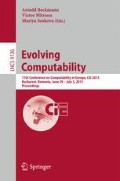Abstract
We prove effective versions of some classical results about measurable functions and derive from this extensions of the Suslin-Kleene theorem, and of the effective Hausdorff theorem for the computable Polish spaces (this was established in [2] with a different proof) and for the computable \(\omega \)-continuous domains (this answers an open question from [2]).
V. Selivanov—Supported by a Marie Curie International Research Staff Exchange Scheme Fellowship within the 7th European Community Framework Programme, by DFG Mercator Programme at the University of Würzburg, and by RFBR project 13-01-00015a.
Access this chapter
Tax calculation will be finalised at checkout
Purchases are for personal use only
References
Abramsky, S., Jung, A.: Domain theory. In: Abramsky, S., Gabbay, D.M., Maibaum, T.S.E. (eds.) Handbook of Logic in Computer Science, vol. 3, pp. 1–168. Clarendon Press, Oxford (1994)
Becher, V., Grigorieff, S.: Borel and Hausdorff hierarchies in topological spaces of Choquet games and their effectivization. Math. Struct. Comput. Sci. Available on CJO (2014). doi:10.1017/S096012951300025X
Brattka, V.: Effective Borel measurability and reducibility of functions. Math. Logic Q. 51(1), 19–44 (2005)
de Brecht, M.: Quasi-Polish spaces. Ann. Pure Appl. Logic 164, 356–381 (2013)
Ershov, Y.L.: On a hierarchy of sets 1,2,3 (in Russian). Algebra i Logika 7(4), 15–47 (1968)
Gregoriades, V., Kispeter, T., Pauly, A.: A comparison of concepts from computable analysis and effective descriptive set theory. Mathematical structures in computer science (submitted to). arxiv.org/pdf/1403.7997
Gregoriades V.: Effective refinements of classical theorems in descriptive set theory (informal presentation). Talks at Conference “Computability and Complexity in Analysis” in Nancy (2013). http://cca-net.de/cca2013/slides/
Gregoriades, V.: Classes of polish spaces under effective Borel isomorphism. Mem. Amer. Math. Soc. (to appear). www.mathematik.tu-darmastadt.de/gregoriages/papers/eff.webpage.pdf
Grubba, T., Schröder, M., Weihrauch, K.: Computable metrization. Math. Logic Q. 53, 381–395 (2007)
Hemmerling, A.: The Hausdorff-Ershov hierarchy in Euclidean spaces. Arch. Math. Logic 45, 323–350 (2006)
Kechris, A.S.: Classical Descriptive Set Theory. Graduate Texts in Mathematics, vol. 156. Springer, New York (1995)
Korovina, M.V., Kudinov, O.V.: Basic principles of \(\varSigma \)-definability and abstract computability. Schriften zur Theoretischen Informatik, Bericht Nr 08–01, Univeversität Siegen (2008)
Louveau, A.: Recursivity and compactness. In: Müller, G.H., Scott, D.S. (eds.) Higher Set Theory. Lecture Notes in Mathematics, vol. 669, pp. 303–337. Springer, Heidelberg (1978)
Louveau, A.: A separation theorem for \(\varSigma ^1_1\)-sets. Trans. Amer. Math. Soc. 260(2), 363–378 (1980)
Moschovakis, Y.N.: Descriptive Set Theory. North Holland, Amsterdam (2009)
Motto Ros, L., Schlicht, P., Selivanov, V.: Wadge-like reducibilities on arbitrary quasi-Polish spaces. Mathematical structures in computer science (to appear). arXiv:1304.1239 [cs.LO]
Rogers Jr., H.: Theory of Recursive Functions and Effective Computability. McGraw-Hill, New York (1967)
Selivanov, V.L.: Wadge degrees of \(\omega \)-languages of deterministic Turing machines. Theor. Inf. Appl. 37, 67–83 (2003)
Selivanov, V.L.: Variations on the Wadge reducibility. Siberian Adv. Math. 15, 44–80 (2005)
Selivanov, V.L.: Towards a descriptive set theory for domain-like structures. Theor. Comput. Sci. 365(3), 258–282 (2006)
Selivanov, V.L.: On the difference hierarchy in countably based \(T_0\)-spaces. Electron. Notes Theor. Comput. Sci. 221, 257–269 (2008)
Gao, S.: Invariant Descriptive Set Theory. CRC Press, New York (2009)
Weihrauch, K.: Computable Analysis. Springer, Berlin (2000)
Acknowledgement
I thank the anonymous referees for useful comments and bibliographical hints.
Author information
Authors and Affiliations
Corresponding author
Editor information
Editors and Affiliations
Rights and permissions
Copyright information
© 2015 Springer International Publishing Switzerland
About this paper
Cite this paper
Selivanov, V. (2015). Towards the Effective Descriptive Set Theory. In: Beckmann, A., Mitrana, V., Soskova, M. (eds) Evolving Computability. CiE 2015. Lecture Notes in Computer Science(), vol 9136. Springer, Cham. https://doi.org/10.1007/978-3-319-20028-6_33
Download citation
DOI: https://doi.org/10.1007/978-3-319-20028-6_33
Published:
Publisher Name: Springer, Cham
Print ISBN: 978-3-319-20027-9
Online ISBN: 978-3-319-20028-6
eBook Packages: Computer ScienceComputer Science (R0)

